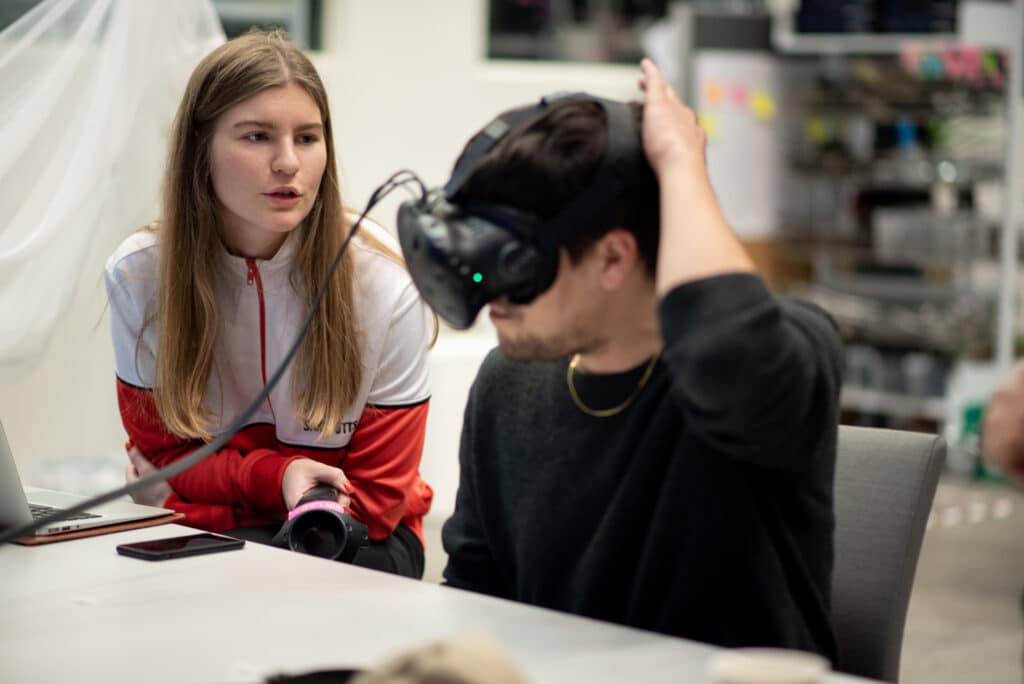When Mads Tofte, ex-vice chancellor of IT University of Copenhagen first set up the university’s website, he did it from his bedroom at home. The website read: “Welcome to IT-Højskolen, we are not quite sure what this is going to be about, but if you are interested, please leave your name and email address, and we will contact you when we have found out.”
ITU is known as Denmark’s youngest university, and the first in the country to be devoted to IT research and education. They have gone on to offer undergraduate and postgraduate programmes, such as Software Development, Computer Science, Games, Digital Design and Interactive Technologies, and Data Science. Thousands of students have completed their education there, and over 100 startups had their humble beginnings in the heart of ITU.
Beyond the classrooms, ITU provides a vibrant and collaborative environment with their unique campus design. The university provides students with opportunities to foster connections with their fellow coursemates, interact with creative minds from other departments and build relationships with lecturers and industry leaders.

Beatriz & Pedro, both current students studying an MSc in Games. Source: IT University of Copenhagen.
Pedro Rainha, an MSc in Games graduate, appreciates the variety of guest teachers and industry experts who came to ITU to host sessions for students. Right from the first semester, ITU teachers and lecturers would inform students promptly of any available talks, events or even job postings that were related to the games industry.
“I remember there were studio visits that were extremely cool and got us a few contacts. There was also the job fair, where it was nice to get to talk to industry professionals and connect on LinkedIn to see if you’re the right fit for them,” says Rainha.
Rainha hails from Portugal and moved to Luxembourg when he was 14. Born with a natural love for video games, he travelled to London to study game design and programming. He then took up an MSc in Games at ITU as he was enthusiastic about experimenting and creating new stories.
ITU’s MSc in Games offers two tracks — the technology track, which requires a background in computer science and emphasises the implementation of specific technologies, and the design track, which focuses on playful design methods without requiring previous programming skills.

The MSc in Games is as much about making as it is about understanding. It provides you with practical and theoretical knowledge on how computer games are made, how they create meaning, and how they impact our social interactions and communities. Source: IT University of Copenhagen
“The Tech track stood out to me before I joined because it seemed like I could experiment a lot,” says Rainha.
The programme equips students to shape the future of games. It provides practical and theoretical knowledge on how games are made, how they create meaning, and how they impact social interactions and communities. Students are encouraged to work in teams, creating games together and learning from some of the world’s leading games researchers.
“Working in teams is valuable because it feels like you have been in a company situation — even though it’s a small company, you learn a lot about production, tight deadlines and how you organise yourself around that,” says Rainha, who believes that working in a team has led him to develop his professional skills.
Hanna Wirman, Head of Study Programme, has been a great source of support for students like Rainha. She has devoted a large part of her career to investigating extraordinary ways in which games are used against their developers’ original intentions and now works to help new generations of students cultivate their passion for games.
Wirman’s work and her bright personality have also inspired Beatriz Tereso de Sa, another MSc in Games graduate. Despite it being her first time studying abroad, Tereso is an active member of the Women in Games Denmark, and helps to organise events for women studying or working in the gaming industry.

You will work with some of the world’s leading games researchers, explore cutting-edge technologies for their playful potential, and become an expert in how to realize creative projects in interdisciplinary teams. Source: Shutterstock
“As a member of Women in Games Denmark, I’m interested in proving that women should be included at the big table,” says Sá, who cites Wirman as one of her favourite educators and biggest supporters in ITU. “Being surrounded by powerful women like Hanna gives me a reason to continue fighting for this cause.”
Similar to Rainha, Sá chose the Tech track as she came from a background in computer science. Both students were interested in ITU’s offerings after attending the university’s Open House event.
“They talked about some of the courses, mainly ‘Making Games’ and ‘Game World Design,’ which are the most impactful courses in the master’s,” says Sá. “They also showed projects and events they had around it and how closely connected they are to the industry.”
The interactive nature of the programme has benefited students by opening up professional opportunities and career paths in the gaming industry. Both graduates have gone on to receive offers from companies during their summer break. Rainha was surprised to hear from two different companies, who were both recommended to reach out to him. Sá chanced upon the CEO of Light Brick Studio at an event, and after a short chat, was delighted to hear that the studio was very keen on her work and wanted to continue collaboration.
“I think the master’s helped me to try a bit of everything. That was one of my biggest experiential learning opportunities that I had, being able to do a bit of everything and also realising that I can do it and that I am not only one thing,” says Sá. “That excites me a lot in general, also for future opportunities in the industry.”
Visit ITU’s page for more information on their offerings, or follow them on Facebook, X, LinkedIn, Instagram and YouTube.










